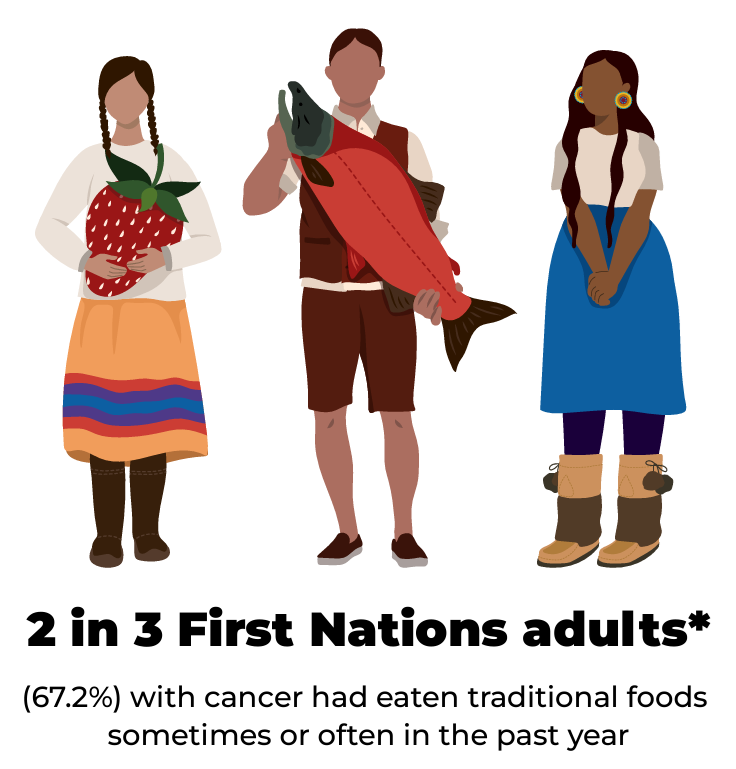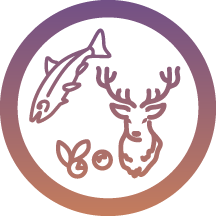Was there integration of traditional foods for those wishing to have it?
Why is this indicator important to First Nations, Inuit and Métis?
 Traditional Indigenous foods offer cultural, social and nutritional benefits that can contribute to wholistic health.
Traditional Indigenous foods offer cultural, social and nutritional benefits that can contribute to wholistic health.
Such foods include country foods,1 wild game, fish, berries and plants which are important not just for their nutritional value but from a cultural and spiritual standpoint as well.
Traditional foods and plants from the land or territory of the Indigenous patient draw strength from and mutually reinforce Indigenous patients’ connection with their land and cultural teachings.2
View Indigenous determinants of health
How does this affect care and outcomes?
 From a preventative standpoint, traditional foods and the activity involved in gathering traditional foods and medicines can strengthen a person’s health. A nutritious diet rich in traditional foods accompanied by land-based physical activity can aid in preventing obesity in Indigenous communities. Obesity is a known risk factor for certain cancers.
From a preventative standpoint, traditional foods and the activity involved in gathering traditional foods and medicines can strengthen a person’s health. A nutritious diet rich in traditional foods accompanied by land-based physical activity can aid in preventing obesity in Indigenous communities. Obesity is a known risk factor for certain cancers.
When provided in hospital settings, traditional foods have added benefits beyond their nutritional value. Benefits such as psychological, emotional and spiritual support to people living with cancer have been described.
Most importantly, traditional foods in care settings which are “recognizable and comforting to them” help patients feel empowered in facing their health issues.3
Culturally appropriate care includes not only providing culturally-safe supports, but also ensuring access to country foods,4 and the integration of traditional medicines in the care plan.
Unique perspectives from First Nations

*First Nations adults who live on reserve or in Northern communities
Data source: First Nations Information Governance Centre, First Nations Regional Health Survey (Phase 3, Adult Survey, 2018)
Towards health equity
 Traditional foods have a legitimate place in health care.5
Traditional foods have a legitimate place in health care.5
However, policies such as health and safety, food inspection and food safety must be adjusted to allow the inclusion of traditional foods in healthcare settings.
When healthcare settings are inclusive of Indigenous cultures and their traditional foods they become more culturally safe for Indigenous Peoples.
Cultural safety is an important mechanism to redress significant health disparities that result from colonial trauma.
What this would mean for people in Canada
The quality of healthcare provision is improved in a system that is culturally safe and inclusive of cultural practices such as traditional foods for Indigenous Peoples.6
View indicator development process
View ways of measuring the indicators
- Food from wild animals and plants in remote northern regions. For Inuit, this includes caribou, whales, seals, ducks, arctic char, shellfish and berries among other sources. Statistics Canada. Harvesting and country food: fact sheet. 2007. Available from: www150.statcan.gc.ca/n1/pub/89-627-x/89-627-x2007001-eng.htm
- “For many Aboriginal groups, healthy eating is based on the premise of the consumption of traditional foods, which in addition to contributing to nutrition, is an important indicator of cultural expression, an anchor to culture and personal well-being, an essential agent to promote holistic health and culture, and the direct link between the environment and human health.” “Consumption of traditional foods is not just about eating; it is the endpoint of a series of culturally meaningful processes involved in the harvesting, processing, distribution and preparation of these foods. For many Aboriginal peoples, these processes require the continued enactment of culturally important ways of behaving, which emphasize cooperation, sharing and generosity.” Willows ND. Determinants of healthy eating in Aboriginal Peoples in Canada: The current state of knowledge and research gaps. Can. J. Public Health. 2005; 96(3):S32-S36.
- Nourish. Traditional food as medicine at Sioux Lookout Meno Ya Win Hospital. Available here: www.nourishleadership.ca/practice-study-slmhc
- Canadian Partnership Against Cancer. Acts of Reconciliation. 2018.
- “Traditional medicine has a long history. It is the sum total of the knowledge, skill, and practices based on the theories, beliefs, and experiences indigenous to different cultures, whether explicable or not, used in the maintenance of health as well as in the prevention, diagnosis, improvement or treatment of physical and mental illness.” World Health Organization. Traditional, complementary and integrative medicine. Available here: www.who.int/health-topics/traditional-complementary-and-integrative-medicine#tab=tab_1
- United Nations Declaration on the Rights of Indigenous Peoples, Article 24 and Truth and Reconciliation Call to Action 22

